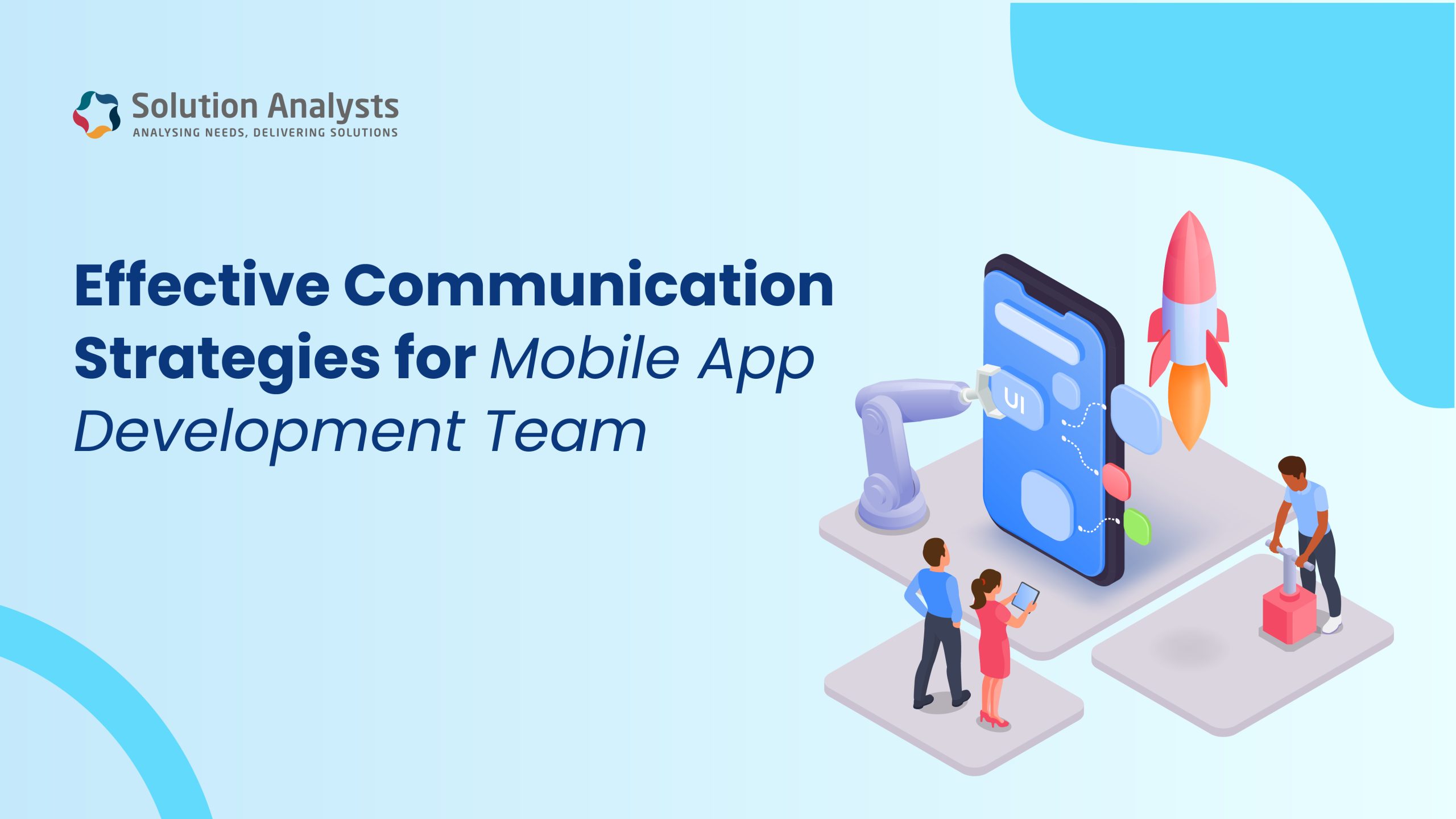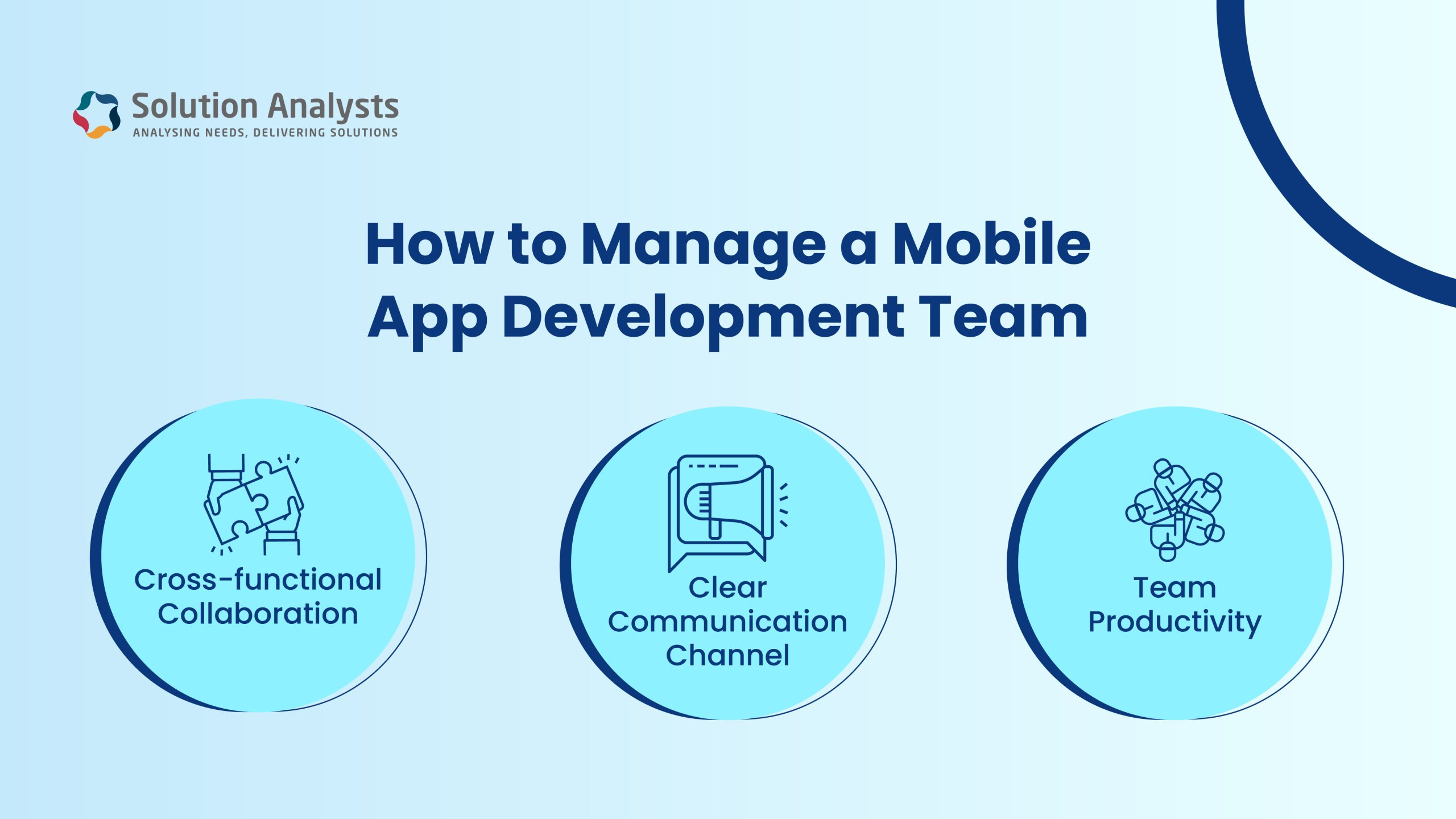
Table of Contents
The key to a successful mobile app development team is good communication. As the software development lifecycle (SDLC) progresses, it guarantees alignment, job management, and seamless collaboration. The following are some ways that your app development team can communicate better with one another.
Organizational Framework for Mobile App Developers
Mobile app developers, backend developers, testers, project managers, and solution architects are the usual members of a mobile app development team. Despite the importance of each function, work can easily get dispersed in the absence of a clear hierarchy and established lines of communication.
Make sure everyone on the team understands their part in developing the app and has clear duties to ensure the project runs well. In order to create a top-notch mobile app, it is essential to have a well-structured team that encourages improved cross-functional cooperation across various departments.
1. Establish Clear Duties: Nobody loves uncertainty, particularly when it concerns the division of labor. To prevent duplication of labor and promote individual responsibility, it is important to establish clear team roles from the beginning.
2. Kick-off meetings: When a project begins, the entire team gets together to go over the objectives, timeline, and roles and duties of everyone. The success of a project depends on everyone knowing their role and how to contribute.
During app development
effective communication is key, so make sure all lines of communication are clear. Clear lines of communication eliminate room for confusion and save time.
Recommended Methods
• Use Project Management Tools: To keep tabs on tasks and their status in real time, try using a project management tool like Zoho Projects, Jira, or Trello.
• Platforms for Communication: Slack or Teams are great for having fast chats that keep the team on the same page.
• Foster Collaborative Problem-Solving: The technical aspects of app development necessitate teamwork across many departments.
Strategies
• Stand-ups: Brief meetings held every day allow team members to discuss challenges and share success.
• Collaborating Across Departments: To find problems faster, have developers, testers, and designers all talk to each other.
• Make Use of Visual Communication: Wireframes and prototypes are great visual aids for explaining complicated ideas when talking about technical specs or design.
Visual Tools:
• like Figma or Sketch to create wireframes and prototypes that will help with user interface and experience design.
• You can explain design changes or bugs with video walkthroughs. Just share screenshots or recordings.
• Encourage Openness: Trust and cooperation are enhanced via honest and forthright communication.
Practical Measures
• Keep Everyone Informed: Make sure everyone is aware of the project’s status by using regular progress updates or short reports.
• Improve processes and encourage ownership by setting up avenues for feedback.
• Techniques for Efficient Remote Communication: Changing communication tactics for dispersed teams is essential as remote work grows in popularity.
Best Practices for Remote Teams:
• Consider all time zones when scheduling meetings or depend on asynchronous communication methods like email as best practices for remote teams.
• Slack and other asynchronous platforms are great for sharing changes that don’t necessitate instantaneous replies.
Efficient Methods of Documentation
The foundation of every successful team developing mobile apps is documentation. It guarantees that all stakeholders, developers, designers, testers, and team members have access to necessary information at all times during the software development lifecycle. Projects that are well-documented are easier to understand, run more smoothly, and have fewer misconceptions that could cause delays or expensive blunders.
Key Documentation Types:
• Project requirements, user stories, and functional and non-functional needs should be clearly outlined in the app’s documentation.
• Keep track of the app’s structure, data flows, and technology stacks in the system architecture document.
• Guidelines for Development: Keep to version control techniques and coding standards to make sure code is consistent.
• In order to avoid errors, it is important to document all functional tests in the test cases.
• Guides for Users and Deployment: Make handoffs easier by providing end-user manuals and deployment procedures.
In order to facilitate future scalability, clarity, and avoidance of confusion, it is imperative that documentation be kept up to date.
Involve Your Team Lead When Establishing a Schedule
The key to a successful mobile app development team is a realistic schedule. Team leads should be consulted to keep the project schedule in line with the Software Development Lifecycle (SDLC) stages. You can establish mutually agreeable goals and due dates by meeting with the team leader early on in the project.
Project schedules can be better coordinated with important milestones like design, development, testing, and deployment with the help of insights offered by an experienced team lead. In order to align the timeframe appropriately, the team lead can also assist in identifying potential dependencies and risks.
Project management software such as JIRA or Trello allows team leads to divide large projects into manageable chunks with due dates. By keeping everyone updated on the project’s status, these technologies make guarantee that delays are less likely to occur. The project will go more smoothly if you involve the team lead in creating a schedule that takes into account the team’s capabilities as well as the project’s complexity.
A Guide to Leading a Team in the Creation of Mobile Apps

Efficiently leading a team that develops mobile apps means striking a balance between getting things done and keeping everyone in the loop. Here are a few important approaches:
• Foster cross-functional cooperation: Get the development, design, and quality assurance teams to work together. As a result, the team’s output will increase, and everyone will be working toward the same objectives. Encourage an atmosphere where suggestions are freely exchanged and comments are appreciated.
• Modes of Effective Communication: Complicating matters further is the management of remote teams. Make sure there are obvious ways to communicate, like using Slack for IM or Zoom for video/audio conferences. Asynchronous communication systems, such as email or project management platforms, allow teams operating in various time zones to be informed without having to wait for real-time feedback.
• Team Productivity: Make use of productivity tools to keep tabs on how well people are doing, who needs to do what, and how far along the project is in relation to its milestones. To maintain team accountability and morale, set up daily standups and regular check-ins. This contributes to the smooth progress of the project by reducing obstacles. In order to boost team output, it is important to conduct regular project health checks.
Maintaining Team Cohesion through Regular Meetings
The foundation of good team alignment is regular meetings. Regular meetings, such as stand-ups or check-ins, allow teams to remain in sync, address roadblocks, and modify their tasks to meet deadlines.
• Daily Stand-Up Meetings: To address obstacles, plan for the day, and report progress, agile teams frequently use these short meetings. In fast-paced settings where goals might change at any moment, this is particularly helpful for keeping everyone focused and aligned.
• Weekly meetings provide a more in-depth opportunity to review project progress, including the achievement of important milestones or features. This allows for more thorough discussion of the topic. Meetings like these are great for seeing patterns in progress, talking about dangers, and rearranging priorities if needed.
• Cross-Functional Meetings: Developers, testers, project managers, and other stakeholders should regularly gather for cross-functional meetings to promote collaboration and open communication throughout the project. By coming together in these meetings, we can fix integration problems, reach consensus on design choices, and make sure the product is heading in the right direction for a final release.
• To keep external stakeholders abreast of project progress and incorporate their feedback in real-time, it is helpful to arrange regular meetings with customers to provide updates. This makes sure that the final product meets the client’s expectations and reduces the likelihood of last-minute adjustments.
• Retrospective Meetings: Following each significant milestone, the team can assess the achievement of goals, identify areas for improvement, and discuss what went well and what didn’t. A culture of accountability and constant development is nurtured in this way.
How Much Does It Cost to Employ a Team to Develop a Mobile App? There are a lot of non-wage expenses associated with hiring a mobile app development team, including things like software, hardware, and communication platforms. A lot of factors, such the level of skill needed and the intricacy of your project, will determine the final price tag. Important factors are outlined below:
• Team size and level of experience: Expenses will be greater for teams with more experience. On the other hand, a competent crew can get the job done more quickly and with fewer errors, which could end up saving money.
• Collaboration Platforms: You should also set aside funds for the resources that will be required to oversee the team, such as collaboration platforms. Tools for communication, version control, and project management, such as Slack, GitHub, and Asana, are available at different pricing points. To keep communication flowing smoothly and to effectively manage projects, these collaboration platforms are essential.
• Project Duration and Scope: The total cost is affected by the number of development hours required for larger and more complicated programs. Expenses rise for apps with complex features like AI integration, real-time data processing, or extensive security measures, since these features necessitate developers with specialized expertise.
• Beyond the original investment in development, there are continuing costs to consider, such as those associated with upgrades, bug corrections, and the addition of new features.
If you want your mobile app project to be a success while staying within budget, it’s crucial to invest in the correct team and resources.
Get in touch with us to talk about your ideas for a mobile app, and we’ll help you find the best team to put them into action.
Conclusion
A mobile app development team’s ability to effectively communicate is crucial to their success. In order to keep your team from falling into the traps of miscommunication, it is important to set up clear channels, promote transparency, and encourage collaboration. Whether your team is located in the office or across the globe, these tactics will help your projects run more smoothly and boost morale.

Ankit Thakkar
Delivery Manager
Ankit is a skilled Delivery Manager with 13+ years in development and project management, has successfully led teams of 40+ across multiple complex projects. With expertise in mobile and web technologies, he’s delivered impactful solutions across Social, IoT, E-Commerce, Healthcare, and Entertainment domains. Known for his strategic approach, Ankit is passionate about driving innovation and success in every project.











 sales@solutionanalysts.com
sales@solutionanalysts.com solution.analysts
solution.analysts






